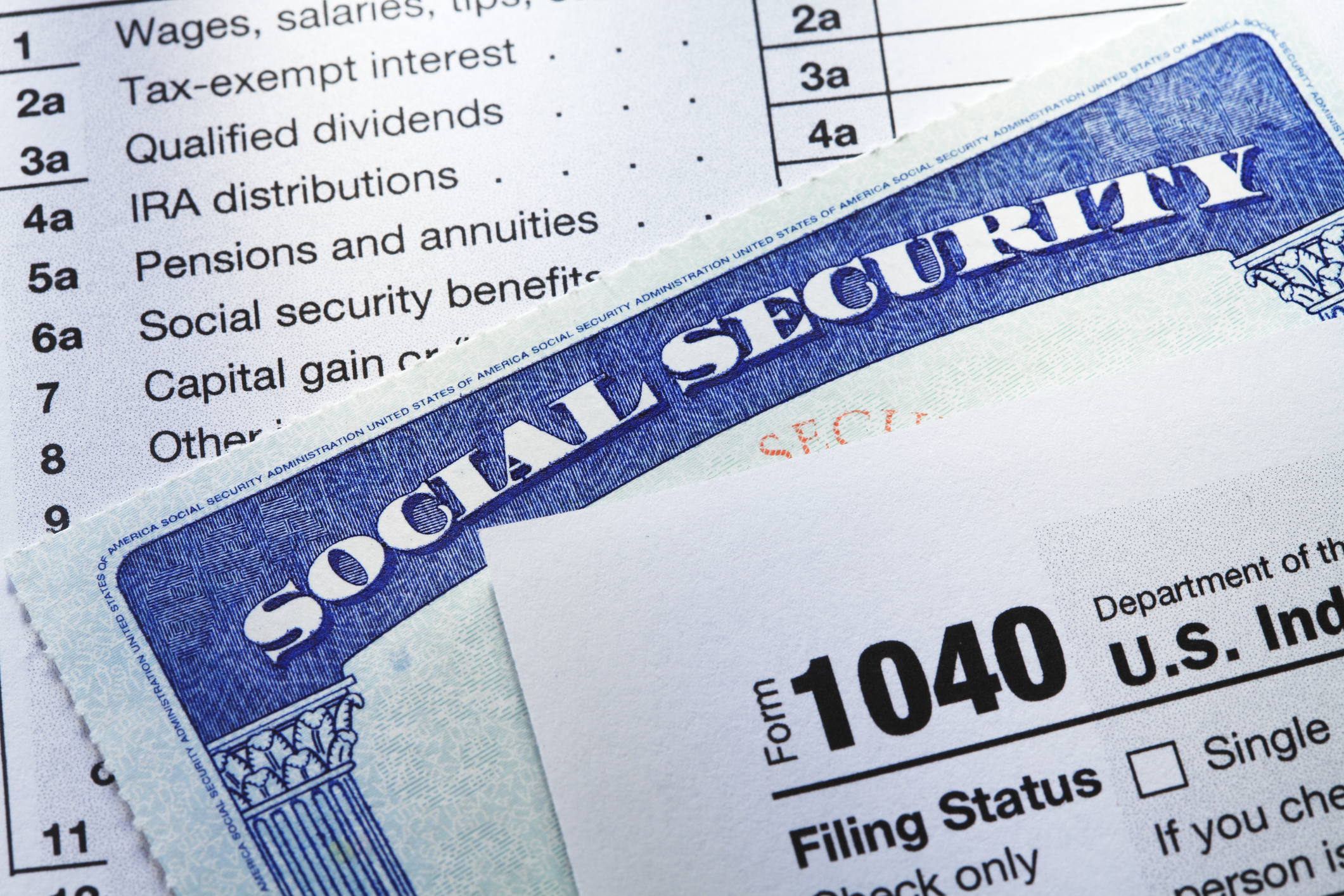Why You Should Expect a Lower Social Security COLA for 2025
A decline in the inflation rate is likely to bring down the cost-of-living adjustment to Social Security benefits.


Profit and prosper with the best of Kiplinger's advice on investing, taxes, retirement, personal finance and much more. Delivered daily. Enter your email in the box and click Sign Me Up.
You are now subscribed
Your newsletter sign-up was successful
Want to add more newsletters?

Delivered daily
Kiplinger Today
Profit and prosper with the best of Kiplinger's advice on investing, taxes, retirement, personal finance and much more delivered daily. Smart money moves start here.

Sent five days a week
Kiplinger A Step Ahead
Get practical help to make better financial decisions in your everyday life, from spending to savings on top deals.

Delivered daily
Kiplinger Closing Bell
Get today's biggest financial and investing headlines delivered to your inbox every day the U.S. stock market is open.

Sent twice a week
Kiplinger Adviser Intel
Financial pros across the country share best practices and fresh tactics to preserve and grow your wealth.

Delivered weekly
Kiplinger Tax Tips
Trim your federal and state tax bills with practical tax-planning and tax-cutting strategies.

Sent twice a week
Kiplinger Retirement Tips
Your twice-a-week guide to planning and enjoying a financially secure and richly rewarding retirement

Sent bimonthly.
Kiplinger Adviser Angle
Insights for advisers, wealth managers and other financial professionals.

Sent twice a week
Kiplinger Investing Weekly
Your twice-a-week roundup of promising stocks, funds, companies and industries you should consider, ones you should avoid, and why.

Sent weekly for six weeks
Kiplinger Invest for Retirement
Your step-by-step six-part series on how to invest for retirement, from devising a successful strategy to exactly which investments to choose.
Inflation presents a challenge for most American households, but it can be particularly pernicious for retirees who live on a fixed income. For that reason, retirees who have signed up for Social Security benefits closely monitor the annual cost-of- living adjustment in their payments. Forty percent of seniors rely on Social Security for more than half of their monthly income, and 14% rely on it for more than 90% of their income, according to an analysis by AARP.
Those seniors may be disappointed by the increase in their benefits in 2025. If the inflation rate remains on track, the annual adjustment will be less than 3%, the smallest increase since 2021. The Kiplinger Letter forecasts that the 2025 COLA will be 2.6%, down from 3.2% in 2024.
The 2025 COLA will be based on the Consumer Price Index for Urban Wage Earners and Clerical Workers in the third quarter of 2024. So if inflation rises before October, the COLA will be adjusted upward — or if inflation declines, the COLA will be reduced. However, The Kiplinger Letter forecasts that the inflation rate for the rest of the year is unlikely to fall below recent levels.
From just $107.88 $24.99 for Kiplinger Personal Finance
Become a smarter, better informed investor. Subscribe from just $107.88 $24.99, plus get up to 4 Special Issues

Sign up for Kiplinger’s Free Newsletters
Profit and prosper with the best of expert advice on investing, taxes, retirement, personal finance and more - straight to your e-mail.
Profit and prosper with the best of expert advice - straight to your e-mail.
What the 2025 COLA will mean for retirees
The estimated 2025 COLA would still be larger than the average COLA before the pandemic’s effects ignited the inflation rate. Still, the COLA would fall short of the rate of inflation for retirees’ actual costs, advocates for seniors say.
Seniors who own their homes have been insulated from steep increases in monthly rents, but older homeowners still have to pay property taxes and homeowners insurance, both of which have also risen sharply in recent years. Housing costs also include electric bills, which spiked over the summer because of record-setting heat, says Mary Johnson, a Social Security and Medicare analyst, who forecasts a Social Security COLA of 2.7%.
Health care costs have also risen faster than the rate of inflation and account for a disproportionate percentage of retirees’ overall costs, Johnson says. Retired Americans spend an average of 14% of their monthly income on prescription drugs and other out-of-pocket medical expenses, according to a survey of retirees by Schroders, a wealth management firm.
Inflation in health care costs increases Medicare Part B premiums, which cover doctor’s visits and other types of outpatient medical care. Most retirees have their Part B premiums automatically deducted from their Social Security payments, so an increase in premiums can diminish the boost from the COLA. In its annual report released in March, Medicare’s board of trustees predicted that standard Medicare Part B premiums will increase about 5.8% in 2025, to $185 a month, up from $174.80 a month in 2024. The Centers for Medicare & Medicaid Services (CMS) will announce Medicare Part B premiums for 2025 this fall.
Increases in Part B premiums reverberate a bit more for a subset of seniors who are subject to the Medicare high-income surcharge, also known as the income-related monthly adjustment amount (IRMAA). The surcharge is based on beneficiaries’ modified adjusted gross income from two years earlier, so the 2025 surcharge will be based on seniors’ MAGI in 2023 (MAGI is a taxpayer’s adjusted gross income with a handful of deductions added back, including student loan interest, tax-exempt Social Security payments and excluded interest on savings bonds).
CMS hasn’t announced the amount of the 2025 surcharge yet, but seniors who are subject to it are expected to pay Part B premiums ranging from $259 to $628.90, according to an analysis by Kiplinger.com.
Prices for prescription drugs also increase at a faster rate than inflation, Johnson says, although seniors with high drug costs will get some relief in 2025: Out-of-pocket costs for prescription drugs will be capped at $2,000 a year. The cap was included in the 2022 Inflation Reduction Act. The law also gives Medicare the ability to negotiate prices for some high-cost drugs, but that won’t have an appreciable effect on drug prices next year, Johnson says.
Plan ahead with an HSA
One of the most effective ways to prepare for health care costs in retirement is to contribute to a health savings account. Contributions to an HSA are pretax if you have an account through your employer (or tax-deductible if your plan is not from an employer), the money grows tax-deferred through the years, and you can withdraw it tax-free for eligible medical expenses at any time in the future.
Once you enroll in Medicare, you can no longer contribute to an HSA, but you can use money in your account to pay premiums for Medicare Part B, Part D prescription-drug coverage, or a Medicare Advantage plan.
If you have a health insurance policy with a deductible of at least $1,600 for single coverage or $3,200 for family coverage, there’s still time to contribute to an HSA for 2024. Maximum contributions for 2024 are $4,150 for self-only coverage and $8,300 for family coverage; those maximums increase by $1,000 if you’re 55 or older. In 2025, you can contribute up to $4,300 for self-only coverage if you have a plan with a deductible of at least $1,650; $8,550 for family coverage if you have a deductible of at least $3,300.
Note: This item first appeared in Kiplinger Personal Finance Magazine, a monthly, trustworthy source of advice and guidance. Subscribe to help you make more money and keep more of the money you make here.
Related Content
Profit and prosper with the best of Kiplinger's advice on investing, taxes, retirement, personal finance and much more. Delivered daily. Enter your email in the box and click Sign Me Up.

Block joined Kiplinger in June 2012 from USA Today, where she was a reporter and personal finance columnist for more than 15 years. Prior to that, she worked for the Akron Beacon-Journal and Dow Jones Newswires. In 1993, she was a Knight-Bagehot fellow in economics and business journalism at the Columbia University Graduate School of Journalism. She has a BA in communications from Bethany College in Bethany, W.Va.
-
 Dow Loses 821 Points to Open Nvidia Week: Stock Market Today
Dow Loses 821 Points to Open Nvidia Week: Stock Market TodayU.S. stock market indexes reflect global uncertainty about artificial intelligence and Trump administration trade policy.
-
 Nvidia Earnings: Live Updates and Commentary February 2026
Nvidia Earnings: Live Updates and Commentary February 2026Nvidia's earnings event is just days away and Wall Street's attention is zeroed in on the AI bellwether's fourth-quarter results.
-
 I Thought My Retirement Was Set — Until I Answered These 3 Questions
I Thought My Retirement Was Set — Until I Answered These 3 QuestionsI'm a retirement writer. Three deceptively simple questions helped me focus my retirement and life priorities.
-
 I Thought My Retirement Was Set — Until I Answered These 3 Questions
I Thought My Retirement Was Set — Until I Answered These 3 QuestionsI'm a retirement writer. Three deceptively simple questions helped me focus my retirement and life priorities.
-
 How You Can Use the Financial Resource Built Into Your Home to Help With Your Long-Term Goals
How You Can Use the Financial Resource Built Into Your Home to Help With Your Long-Term GoalsHomeowners are increasingly using their home equity, through products like HELOCs and home equity loans, as a financial resource for managing debt, funding renovations and more.
-
 How to Find Free Money for Graduate School as Federal Loans Tighten in 2026
How to Find Free Money for Graduate School as Federal Loans Tighten in 2026Starting July 1, federal borrowing will be capped for new graduate students, making scholarships and other forms of "free money" vital. Here's what to know.
-
 We've Reached Our $5 Million Retirement Savings Goal, but at 66, My Husband Still Doesn't Feel Ready.
We've Reached Our $5 Million Retirement Savings Goal, but at 66, My Husband Still Doesn't Feel Ready.We are 66 and have reached our retirement savings goal. Our plan is to travel, but my husband can't seem to let go of work.
-
 Aging in Place Can Be Bad for Your Health: This Financial Pro's Alternative Is a No-Brainer
Aging in Place Can Be Bad for Your Health: This Financial Pro's Alternative Is a No-BrainerWhy age alone in financial hardship when you can enjoy companionship — and share the costs of housing, groceries and health care — with a small community of friends?
-
 When It Comes to Retirement Planning, Be More Spock Than Scotty: It's Logical, Captain
When It Comes to Retirement Planning, Be More Spock Than Scotty: It's Logical, CaptainIf you're worried about your retirement, address the concerns in a logical sequence, talk honestly with your team and prepare to go boldly into the future.
-
 A 5-Step Guide to Getting AI to Give You Actionable Insight Rather Than Polished Nonsense
A 5-Step Guide to Getting AI to Give You Actionable Insight Rather Than Polished NonsenseAI can be a powerful specialist, but it can sound smarter than it is when it comes to understanding real-world stakes. That means you have to be the strategist.
-
 5 Side Gigs That Let You Travel the World in Retirement
5 Side Gigs That Let You Travel the World in RetirementEarn as you explore: High-flexibility side gigs that enable retirees to blend work and travel in 2026.